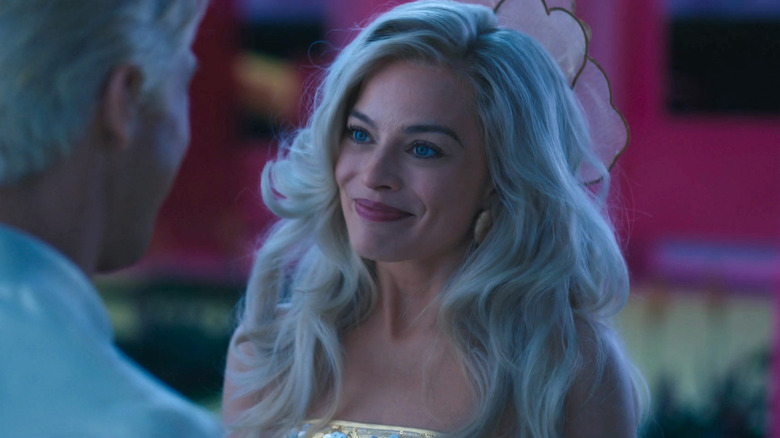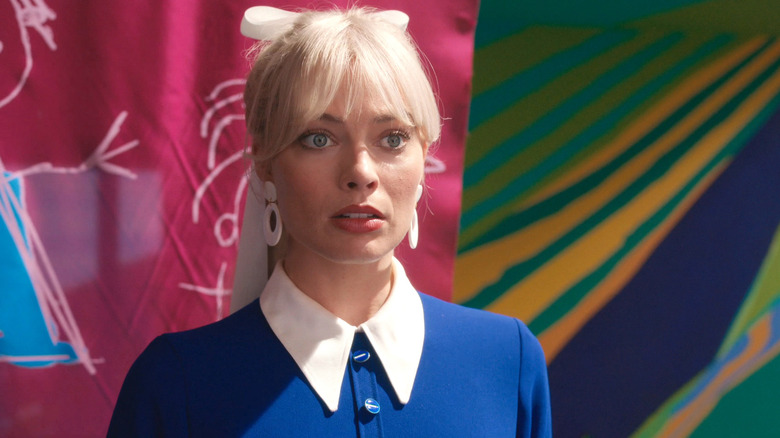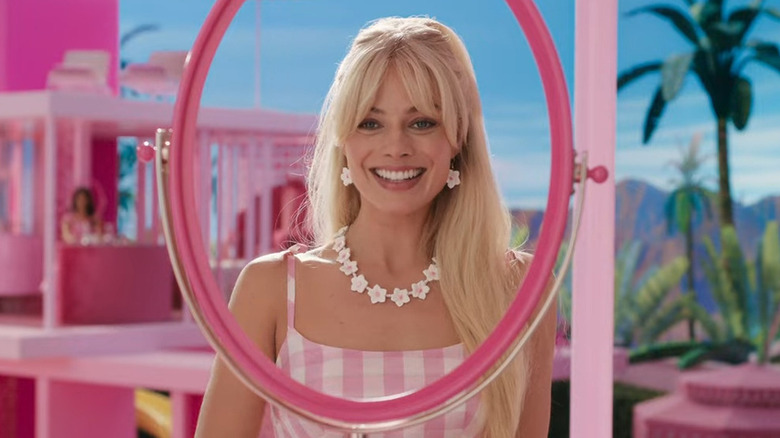How Greta Gerwig Solved Margot Robbie's Biggest Barbie Struggle
After "Barbie" landed the best second-weekend box-office opening for a non-franchise film, it's hard to imagine anyone ever doubted Margot Robbie would be the perfect choice to play a live-action Barbie. Still, that doesn't mean the "Wolf of Wall Street" star didn't struggle to find her groove playing the now-iconic film character.
Robbie revealed in an interview with Vogue that some of the tricks she usually uses as an actor didn't help her with her preparation for "Barbie." The star specifically noted how she's previously looked to certain animals for inspiration — namely, a pit bull and a mustang for her Oscar-nominated turn in "I, Tonya," and an octopus and a honey badger for her performance in "Babylon." Unfortunately, when she tried to utilize her usual "animal work" for "Barbie," Robbie found herself unsatisfied. While she tried referencing a flamingo for her performance as the film's eponymous doll, the actor shared that it was ultimately a recommendation from "Barbie" director Greta Gerwig that made her character finally feel accessible to her.
"I was like, 'Greta, I need to go on this whole character journey.' And Greta was like, 'Oh, I have a really good podcast for you,'" Robbie recalled. The podcast episode in question ended up being about a woman who doesn't ever take the time to introspect, which helped Robbie finally find her way into her "Barbie" character. "You know how you have a voice in your head all the time? This woman, she doesn't have that voice in her head," the actor explained.
Margot Robbie's Barbie will go on a surprisingly complicated emotional journey
Margot Robbie didn't just have to learn how to play a totally oblivious woman in "Barbie." She also had to find a way to rationalize her character's lifestyle. Robbie specifically began to think about how her character's existence as a plastic doll would and wouldn't affect how she presents herself. "If she doesn't have organs, she doesn't have reproductive organs," she shared with Vogue. "If she doesn't have reproductive organs, would she even feel sexual desire? No, I don't think she could. She is sexualized. But she should never be sexy."
Just in case Robbie's character work for "Barbie" wasn't impressive enough, Gerwig revealed in the same Vogue interview that the film's story was influenced by the all-too-common moment in many young American girls' lives when they begin to worry about and conform to the expectations of others. "They're funny and brash and confident, and then they just—stop," Gerwig observed. "How is [Barbie's] journey the same thing that a teenage girl feels? All of a sudden, she thinks, 'Oh, I'm not good enough.'"
The combined insight into Barbie's psychology paid off, as the film has shown no signs of slowing down from its skyrocketing success. While "Barbie" draws from a popular IP and homages several blockbuster franchises like "The Matrix" and beloved musicals like "The Umbrellas of Cherbourg," the film's compassionate center cements its staying power. Of course, it's easy now to see why Robbie's role in "Barbie" initially felt overwhelming. Fortunately, it didn't take long for her and Gerwig to get on the same page.
Margot Robbie had one demand for Mattel
Gerwig and Robbie were conscious of the effect that "Barbie" would have on young girls. Not only did they want Barbie's struggle to acknowledge certain real-life experiences to some degree, but they also set out to make a movie that appealed to several demographics of women. As such, they made sure that Mattel's executives were on board with their vision from the get-go.
While speaking to Time, Robbie discussed how she and Gerwig insisted that the movie feature a wide array of Barbies, as Mattel has created a diverse range throughout the years. "If [Mattel] hadn't made that change to have a multiplicity of Barbies, I don't think I would have wanted to attempt to make a Barbie film," she said.
However, Robbie and Gerwig's reason for wanting several Barbies in the film mainly goes back to their desire to speak to the audience on a human level. "I don't think you should say, 'This is the one version of what Barbie is, and that's what women should aspire to be and look like and act like.'" That message fits perfectly with the film's core conceit: Barbie is for everyone but no Barbie (read: woman) should have to feel like they have to be everything.


